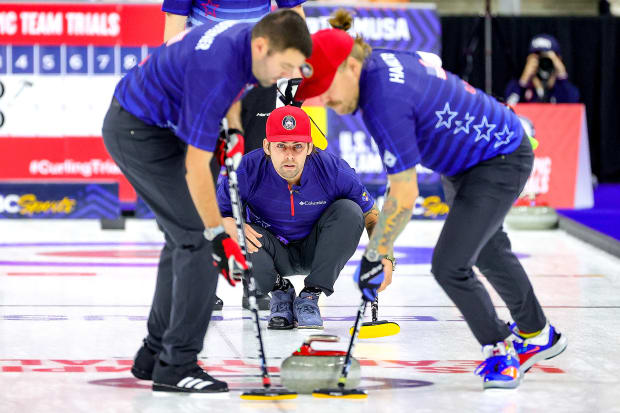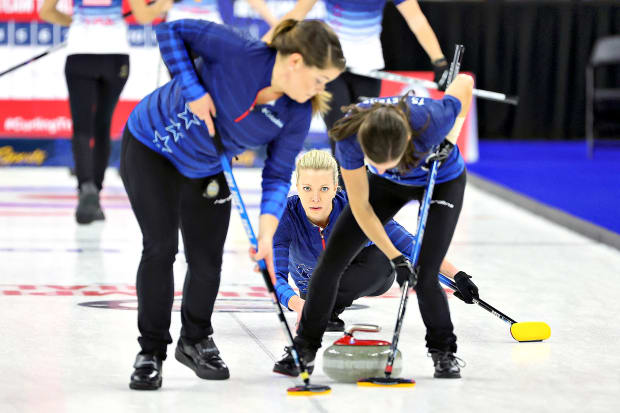Communication is pivotal in curling. Competitors have to think several shots ahead, and strategy discussions often take place among people 150 feet apart at opposite ends of the rink—all while on the clock. (Teams are limited to 38 minutes of “thinking time” per game.)
So it helps that two of the members of Team Peterson—which has a good chance of earning the U.S.’s first Olympic medal in the women’s competition—speak their own language. Tabitha Peterson, the 32-year-old skip, and her younger sister, Tara, are fluent in something called Iber, which was invented by their mother, Gaye, and her sisters. It involves adding ib after the first consonant sound of each syllable (or just adding ib if there’s no consonant). The end result—Tabitha becomes Ti-bab-ib-ith-ib-ba—sounds like Pig Latin spoken by someone who just got a novocaine shot from the dentist.
Their teammates—Becca Hamilton, Nina Roth and alternate Aileen Geving—have picked up a little bit of Iber, but they’ve yet to use it on the ice, even if it would be a wonderful way of disguising the team’s plans. “We maybe should consider that,” says Tara, 30. “When we’re playing the Russians and when we’re playing the Swedes, we don’t know what they’re saying. We don’t speak those languages. But everybody speaks a little English.”

Stacy Revere/Getty Images
For now, Team Peterson speaks that plain old decipherable language, which is probably just as well, because there has been a lot to talk about in the past couple of years. At the 2018 Olympics, Geving, Hamilton, Roth and Tabitha Peterson represented the U.S., with Roth as the skip, curling’s most important job. That player decides which shot will be attempted and usually throws the final two stones, which determine the scoring. It’s sort of a combination of captain, manager and cleanup hitter, and changing skips within a team is not common.
But in 2019, after Roth got pregnant, she told her teammates she was going to, as she tweeted, “take some time to focus on cooking little Roth.” While she was on leave Tabitha would skip the team, with Tara, who had come on board when Geving went on maternity leave a year earlier, filling out the squad. No one was sure what would happen when Roth came back.
Roth had skipped the team to a first-place finish at the 2018 Olympic trials and three seconds at the nationals, as well as a middle-of-the-pack 4–5 record in PyeongChang. With Peterson as skip, the squad played exceedingly well, winning the 2020 nationals and setting up a tough choice. The team (with input from USA Curling and coach Laine Peters) chose to keep Tabitha as the skip. Peterson talked to each player individually.
“My conversation with Nina was, ‘Do you think that you’ll be able to be a third and not think about what your responsibilities were as a skip?’” recalls Peterson. “And she was like, ‘Yep, a hundred percent.’”
Still, things were markedly different. Peterson was now throwing the final stones, while Roth’s role as third meant she had to sweep regularly, a more strenuous role after having Nolan (who turns 2 in February). On the flip side, Peterson’s new gig meant less sweeping and more standing around. “I’m not moving out there as much, so I get very cold,” Tabitha says. “I have a heated vest that I use, because otherwise I literally stay there shivering and can’t feel my hands and then I can’t throw the rock, which is not good. So as long as I stay warm, I’m happy.”
Just as significant was the new power dynamic, which took some getting used to. “Coming back in, I was probably a little bit more quiet, just wanting to let Tabitha know it’s her team, let her call her shots,” says Roth. “She’s throwing those last, high-pressure shots, so it’s important that she feels confident in them. But now, as we’ve played in more games in these positions, I’ve learned when I can say something and when to back off. It’s kind of a dance.”
Of course, the process would have been easier had the team trained face-to-face the entire time, but between COVID-19 and real life—no one is exactly getting rich off sliding rocks, so the team members have day jobs—that hasn’t been possible. Roth and Hamilton live in Madison, Wis., while the Petersons are in the Twin Cities and Geving is in Duluth, Minn. Their routines involve training individually, playing locally and getting together when possible, usually every other weekend.
They would meet over Zoom, where they’d do what Roth calls “homework” assignments. “We did a little book club on a sports psychology book,” she says. “So what did you get from that? How can that help us as a team? And we went back into the game archives. I’m the one who really likes to watch curling. So I would pick a game that was good. We’d look at not just strategy, but at body language and communication, trying to bring any little advantage to our game.”
In the pandemic, ice time became increasingly difficult to come by and competitions were scrapped, so Team Peterson made do with scrimmages, including against U.S. curler John Shuster’s gold-medal-winning men’s team.
Shuster’s rink (curlingese for team) has also undergone substantial change—also with a touch of skip-related drama—since 2018. Tyler George decided to step away from competing, creating an opening that has been filled by Chris Plys. It’s not the 34-year-old’s first trip to the Olympics, though. In ’10 he was an alternate on Shuster’s team. “My intention was to go to the Olympics and hopefully get the brooms ready before the game,” Plys says with a laugh. But during the competition, Shuster struggled mightily and was benched for a match by the coaching staff, a very unusual occurrence in the sport, especially at the Games. “It was awkward,” Plys says. “It was, it was a bit weird.”
Plys skipped that 2010 team to a 4–3 win over France, one of just two wins for the U.S. in nine matches in Vancouver. There were no hard feelings, though. The two get along fine, and Plys is no stranger to the other two members of the team (both of whom won gold in PyeongChang but neither of whom were part of Shuster’s rink in Vancouver): John Landsteiner and Matt Hamilton, who is Rebecca’s brother.
The four solidified their bond during the pandemic, when most major events have been played in bubbles. “I think it really cemented not only that we were teammates, but our friendships,” says Plys. “When you’re living in that close quarters with people, eventually you’re gonna start getting on somebody’s nerves and stuff. It enabled us to have tough conversations and to really understand where each player was at, and what their needs were. I learned when people need space, and when somebody needs a little extra pat on the back or a little extra chat or a compliment to get ’em through something tough. And I think I, uh, learned a little bit about myself.”

Stacy Revere/Getty Images
The 2021 world championships in Calgary were especially tough. Team Shuster made it to the six-team knockout stage. The day before the first playoff match, against Switzerland, Plys was in his hotel room. He had just ordered room service and was texting with a friend on the South Korean team about swapping jerseys when he got a knock on the door. Plys figured he’d either be greeted by someone bearing his meal or a Korean jersey. “Instead it’s a doctor, and the first thing they say is, ‘Hey Chris. Yeah. Well, your tournament’s over. You have COVID.”
Plys, who had been fully vaccinated, was stunned. Officials temporarily halted the tournament (there were three other positives in the bubble that day), and Plys tested negative the next day. After much wrangling, he was allowed to play against Switzerland the following day. “I was in a dark place,” Plys concedes. Without his family and friends nearby, he leaned on his teammates, and he sees the whole experience as something that will help going forward. “I think it made us better and made us tighter,” says Plys (who's also the men’s half of the U.S. mixed doubles team, which has its first game Wednesday at 7 a.m. ET). “The bubble life, it can either make you or break you. It broke some teams for sure. I think we handled it well and it’s going to be very important for us going into Beijing, where there’s going to be a lot of strict guidelines.”
The pandemic obviously impacted Peterson’s team as well. Not being able to curl as often meant that the women had more time to spend on their jobs. (Though not at first for Tara, a dentist, whose profession was deemed nonessential, allowing her to get her golf handicap down to around 7.) Geving works remotely for an insurance company; her LinkedIn bio reads, “Commercial Lines Account Executive and 2018 Olympian.” Hamilton just finished a real estate course. Tabitha is a pharmacist who has delivered thousands of COVID-19 vaccines. “It’s nonstop,” she says. “It’s insanely busy, but it’s nice when people come up to the pharmacy counter and say, ‘Thank you for being here.’ It makes it rewarding.”
Roth has seen the impact of COVID-19 even more starkly. A nurse, she’s putting in three 12-hour shifts a week at a long-term acute care hospital, where many of the patients are dealing with prolonged effects of the disease. “It’s arduous,” she says. “Right now it’s getting a little bit overwhelming, to tell you the truth. But I have a really great support system. My mom watches my son during the day. My dad watches him, too. And my husband’s an amazing dad. So I’m able to practice when I need to.”
Early returns have been positive. Team Peterson finished third at the world championships last May, with Roth the team’s second-most efficient player (behind Tara). In November it won the Olympic trials, looking very much like a squad where everyone is on the same page. Now the curlers hope the communication skills that have helped them weather everything thrown their way the past two years will translate to a successful run in Beijing. Who knows—maybe even a gibold mibedibal.

Stacy Revere/Getty Images







